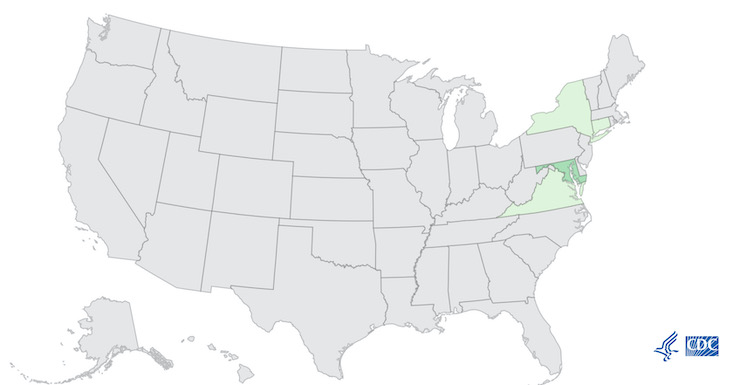A new Listeria outbreak has been announced by the Centers for Disease Control and Prevention (CDC). Hispanic-style fresh and soft cheeses have allegedly sickened seven people in four states as of February 11, 2021. No recall has been issued yet.

The patient case count by state is: Connecticut (1), Maryland (4), New York (1), and Virginia (1). All seven patients have been hospitalized because they are so sick. No one has died. Illness onset dates range from October 20, 2020 to January 22, 2021. Six of those sickened got sick in 2021. The patient age range is from 45 to 75 years. Six of those sickened are of Hispanic origin.
State and local public health officials are interviewing people about what they ate during the month before they started feeling sick. Of the four people who were interviewed, three said they ate at least one type of Hispanic-style fresh and soft cheese and all three said they ate queso fresco. Officials are trying to identify a specific brand or type of cheese.
Officials are using the PulseNet system to try to find people who may be part of this outbreak. DNA fingerprinting on the isolates taken from ill persons, called whole genome sequencing (WGS), showed that the bacteria are closely related genetically. That means the people in this outbreak likely got sick from eating the same food. State investigators are testing samples of Hispanic-style fresh and soft cheese that they collected from stores where sick people said they bought the cheese.

You can contact food safety attorney Fred Pritzker for help by calling 1-888-377-8900 or 612-338-0202.
Noted food safety attorney Fred Pritzker, who has represented many people sickened with Listeria monocytogenes, said, “No food should be contaminated with enough bacteria to make someone sick. Listeria outbreaks are quite serious because the pathogen makes some people very sick. We hope that authorities can solve this outbreak soon.”
The CDC notice states that the true number of those sickened in this outbreak is “likely higher” than the number reported. More people in more states may be ill. Recent illnesses may not be reported yet, and some people recover without medical care and are not tested.
The CDC is advising people who are at high risk for severe Listeria illnesses, including the elderly, pregnant women, and people with chronic illnesses and compromised immune systems, to not eat Hispanic-style fresh and soft cheese, such as queso fresco, until more is known about this outbreak.

If you do choose to eat this type of cheese, make sure it is made with pasteurized milk. This treatment kills pathogens. But even Hispanic-style soft cheeses that are made with pasteurized milk can become contaminated and have caused Listeria monocytogenes outbreaks in the past.
Call your doctor immediately if you develop symptoms of listeriosis after eating these types of products, which include severe headache, high fever, stiff neck, muscle aches, confusion, and convulsions. Pregnant women usually only experience fever, fatigue, and muscle aches, but this infection can cause premature birth, miscarriage, and stillbirth. Symptoms usually start one to four weeks after eating contaminated food, but some may start the same day or as late as 70 days later.

If you or a loved one have been sickened with a Listeria monocytogenes infection after eating Hispanic-style fresh and soft cheeses, please contact our experienced attorneys for help at 1-888-377-8900 or 612-338-0202.




